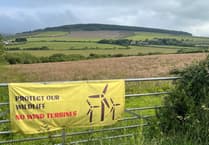In 2017 Manx National Heritage held a special exhibition ’Manx Tholtans’ covering abandoned farmhouses in the uplands of the Isle of Man.
That these former dwellings hold a fascination for the island’s population is not a modern phenomenon - the island’s greatest poet T. E. Brown chose to locate one of his most enduring narrative poems at the home of the eponymous ’Kitty of the Sherragh Vane’, an upland farm high up the Sulby valley.
The fact that the Isle of Man has never formed part of the realm of England or later the United Kingdom has allowed its legal system to develop in many ways quite separately from that of England.
This is perhaps most true when considering land ownership.
By the early 16th century the principal landholdings, known as quarterlands, were delimited within boundaries that in many instances are still recognisable today.
Their occupiers held estates of inheritance, paying yearly rents which, following a period of turbulence culminating in the 1702 Act of Settlement, remained unchanged until abolition in the early 20th century.
It is fortunate that the records of land rents paid have survived in an unbroken series from 1511 to 1911.
This invaluable series of records is known as ’the manorial rolls’.
The two principal series list the annual rents paid for each property and record changes of ownership which were subject to additional payments.
The lecture will also discuss other records useful for research, including James Woods Atlas of 1867, and the tithe and asylum plans on which it was based.
From the late 16th century additional areas of land were brought into cultivation by a process of enclosure known as ’intacking’.
Whilst in many cases intacks were added to existing quarterland holdings, there is evidence of the enclosure of upland parcels to form independent farms which became the homes of generations of the same families.
As part of the process of intacking, a rent was assigned to the enclosed land and the intack rents were listed in the manorial rolls in the same way as quarterland rents.
This has enabled research to be undertaken into the origins and devolution of two upland intack farms in the Sulby Valley.
The enclosures have been dated with some accuracy, proving to be of greater antiquity than had formerly considered to be the case.
Complex changes of ownership between the two holdings have been uncovered and the research has also highlighted the limitations of the manorial rolls in tracing title to land, particularly in later years when superseded by a system of registration of deeds. Additionally, analysis of the records has enabled comparison between the rents levied on different intack farms and similar quarterland holdings.
Manx statutes in the 18th century suggest that intack-holders were regarded as of lesser status than the owners of quarterland farms.
These distinctions are also evidenced in ecclesiastical records, with quarterlands being both assessed to greater contributions to the cost of church buildings but also enjoying the better seating, with intack-holders relegated to poorer pews at the rear of the church.
However, records of communal school-house and bridge-building projects in the nineteenth-century show these distinctions becoming less significant, and by this time it is probable that a farmer was held in higher regard for his personal accumulation of property of whatever description.
Major legislative reforms in 1869 removed any need to distinguish between intack and quarterland. Within a few generations social, economic and demographic changes led to the abandonment of practically all of the upland farms in the Sulby Valley, whether quarterland or intack.
Chris Callow (pictured left) is a native of the Isle of Man and developed a keen interest in Manx land tenure during a 20-year practice as a Manx advocate.
In 2018 he gained an honours degree in history and heritage at University College Isle of Man. In the course of his studies he also trained as a blue-badge tour guide and was admitted to the Guild of Manx Registered Tour Guides in 2017.
He offers guiding services in the Isle of Man through his business Island Heritage Tours. The lecture will take place at the Nunnery, Douglas, at 6pm on Wednesday, April 24. The lecture is free to attend, but booking is essential. Tickets can be reserved www.eventbrite.co.uk.
The next UCM talks sees a return to the island for Professor Peter Edge from Oxford Brookes University, and Prof Clair de Than from the Legal Institute of Jersey.
Together, they will be exploring the distinction between Tynwald and the Isle of Man government, how it has changed over time, and some of the challenges for the future relationship.
This lecture will take place on Tuesday, April 30, at the Nunnery campus.


.png?width=209&height=140&crop=209:145,smart&quality=75)
-(1).jpeg?width=209&height=140&crop=209:145,smart&quality=75)
-(1).jpeg?width=209&height=140&crop=209:145,smart&quality=75)
Comments
This article has no comments yet. Be the first to leave a comment.